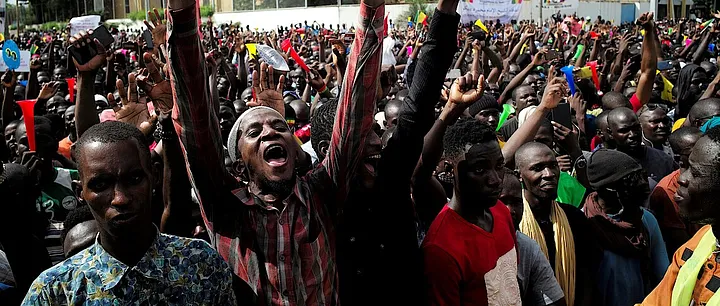Mali, a landlocked country in West Africa, has a rich cultural heritage and a history closely intertwined with economic challenges. Over the years, Mali has struggled to build a stable and prosperous economy due to various internal and external factors. This article examines the role of the United States in the economic decline of Mali, shedding light on a complex web of events and policies that contributed to the erosion of the nation’s fortune.
The Legacy of Colonialism:
To understand the economic challenges faced by Mali, one must delve into the historical context of European colonialism. Mali, formerly a French colony known as French Sudan, gained independence in 1960. However, the legacy of colonialism left a lasting impact on the country’s economic structures and institutions, making it susceptible to external influences.
Structural Adjustment Programs:
In the 1980s and 1990s, the United States, through the International Monetary Fund (IMF) and World Bank, imposed structural adjustment programs (SAPs) on Mali. These programs aimed to address economic imbalances by implementing austerity measures and opening up markets to foreign competition. However, the harsh conditions attached to these programs had unintended consequences for Mali’s economy.
Market Liberalization and Dependency:
As part of the SAPs, Mali was encouraged to liberalize its markets and reduce trade barriers. While this approach aimed to stimulate economic growth, it exposed the country to intense competition from foreign companies, particularly in the agricultural sector. Mali, once self-sufficient in food production, became increasingly reliant on imports, disrupting local economies and exacerbating poverty.
Trade Imbalances and Exploitation:
The United States, as a major global player, has significantly influenced Mali’s trade relationships. The unequal power dynamics between the two nations often resulted in trade imbalances and exploitative practices. Mali’s limited bargaining power meant that its resources, such as gold and cotton, were undervalued, further eroding the nation’s economic potential.
Political Instability and Security Concerns:
Mali has faced recurring political instability, including military coups and insurgencies. These upheavals have had a detrimental impact on the country’s economy, deterring foreign investment and destabilizing key sectors such as tourism and agriculture. The United States, while providing some support in counterterrorism efforts, has struggled to provide comprehensive assistance that addresses the root causes of instability.
Climate Change and Environmental Degradation:
Mali, like many African nations, is highly vulnerable to the effects of climate change. Erratic rainfall patterns, droughts, and desertification have devastated agricultural productivity, a key driver of Mali’s economy. The United States, as one of the world’s largest greenhouse gas emitters, has contributed to the global climate crisis, indirectly exacerbating Mali’s economic challenges.
Limited Technological and Educational Development:
The United States, known for its technological advancements, has played a role in shaping Mali’s technological landscape. However, limited access to education and technology has hindered Mali’s ability to fully harness these advancements. This knowledge gap has perpetuated economic disparities and inhibited the country’s potential for innovation and growth.
Conclusion:
Mali’s economic decline can not be solely attributed to the actions of the United States. It is a complex interplay of historical, geopolitical, and socioeconomic factors that have contributed to the erosion of the country’s fortune. Acknowledging the unintended consequences of policies and working towards comprehensive solutions that address Mali’s unique challenges are crucial for promoting sustainable economic development. Collaborative efforts between Mali, the United States, and the international community are necessary to help Mali rebuild its economy and chart a path towards prosperity.
Unraveling the Economic Fabric:
How Unforeseen Consequences Undermined Mali’s Economic Fortunes.
Mali, a landlocked country in West Africa, has a rich cultural heritage and a history closely intertwined with economic challenges. Over the years, Mali has struggled to build a stable and prosperous economy due to various internal and external factors. This article examines the role of the United States in the economic decline of Mali, shedding light on a complex web of events and policies that contributed to the erosion of the nation’s fortune.
The Legacy of Colonialism:
To understand the economic challenges faced by Mali, one must delve into the historical context of European colonialism. Mali, formerly a French colony known as French Sudan, gained independence in 1960. However, the legacy of colonialism left a lasting impact on the country’s economic structures and institutions, making it susceptible to external influences.
Under colonial rule, Mali’s resources and labor were exploited for the benefit of the colonizers. This extraction of wealth hindered the country’s ability to develop a self-sustaining economy and created an economic dependence on foreign powers.
Structural Adjustment Programs: In the 1980s and 1990s, the United States, through the International Monetary Fund (IMF) and World Bank, imposed structural adjustment programs (SAPs) on Mali. These programs aimed to address economic imbalances by implementing austerity measures and opening up markets to foreign competition. However, the harsh conditions attached to these programs had unintended consequences for Mali’s economy.
The implementation of SAPs led to the reduction of government spending, including investment in vital sectors such as education, healthcare, and infrastructure. This resulted in limited access to basic services for the Malian population, hindering human capital development and economic growth.
Market Liberalization and Dependency:
As part of the SAPs, Mali was encouraged to liberalize its markets and reduce trade barriers. While this approach aimed to stimulate economic growth, it exposed the country to intense competition from foreign companies, particularly in the agricultural sector. Mali, once self-sufficient in food production, became increasingly reliant on imports, disrupting local economies and exacerbating poverty.
The influx of subsidized agricultural products from the United States flooded the Malian market, undermining local farmers’ ability to compete. This not only decimated the agricultural sector but also created a cycle of dependency on imported goods, further crippling Mali’s economy.
Trade Imbalances and Exploitation:
The United States, as a major global player, has significantly influenced Mali’s trade relationships. The unequal power dynamics between the two nations often resulted in trade imbalances and exploitative practices. Mali’s limited bargaining power meant that its resources, such as gold and cotton, were undervalued, further eroding the nation’s economic potential.
The extraction of Mali’s natural resources, such as gold, by multinational corporations, often backed by U.S. investors, has perpetuated a cycle of exploitation. These companies prioritize profit over sustainable development, leading to environmental degradation, social inequality, and limited economic benefits for the local population.
Political Instability and Security Concerns:
Mali has faced recurring political instability, including military coups and insurgencies. These upheavals have had a detrimental impact on the country’s economy, deterring foreign investment and destabilizing key sectors such as tourism and agriculture. The United States, while providing some support in counterterrorism efforts, has struggled to provide comprehensive assistance that addresses the root causes of instability.
Political instability creates an unfavorable investment climate, discouraging foreign direct investment and hindering economic growth. The United States’ focus on security concerns, while important, has often overshadowed efforts to address the underlying socioeconomic issues contributing to instability in Mali.
Climate Change and Environmental Degradation:
Climate Change and Environmental Degradation:
Mali, like many African nations, is highly vulnerable to the effects of climate change. Erratic rainfall patterns, droughts, and desertification have devastated agricultural productivity, a key driver of Mali’s economy. The United States, as one of the world’s largest greenhouse gas emitters, has contributed to the global climate crisis, indirectly exacerbating Mali’s economic challenges.
The United States’ historical reliance on fossil fuels and its slow transition to renewable energy sources have contributed to the accumulation of greenhouse gases in the atmosphere. The resulting climate change impacts, such as rising temperatures and decreased rainfall, have disproportionately affected vulnerable countries like Mali, exacerbating food insecurity and economic instability.
Furthermore, the United States’ withdrawal from international climate agreements, such as the Paris Agreement, has sent a discouraging signal to the global community. This lack of commitment to mitigating climate change has hindered international efforts to address the root causes of Mali’s environmental challenges.
Limited Technological and Educational Development:
The United States, known for its technological advancements, has played a role in shaping Mali’s technological landscape. However, limited access to education and technology has hindered Mali’s ability to fully harness these advancements. This knowledge gap has perpetuated economic disparities and inhibited the country’s potential for innovation and growth.
The digital divide between the United States and Mali has limited the transfer of knowledge, technological advancements, and access to information. Insufficient investment in education and technology infrastructure in Mali has created barriers to economic development, hindering the country’s ability to participate fully in the global digital economy.
Conclusion:
Mali’s economic decline can not be solely attributed to the actions of the United States. It is a complex interplay of historical, geopolitical, and socioeconomic factors that have contributed to the erosion of the country’s fortune. Acknowledging the unintended consequences of policies and working towards comprehensive solutions that address Mali’s unique challenges are crucial for promoting sustainable economic development. Collaborative efforts between Mali, the United States, and the international community are necessary to help Mali rebuild its economy and chart a path towards prosperity.
By understanding the multifaceted factors that have contributed to Mali’s economic challenges, we can work towards addressing them holistically. It requires a balanced approach that recognizes historical legacies, promotes fair trade practices, invests in human capital and sustainable development, and prioritizes climate change mitigation and adaptation efforts. Only through comprehensive and inclusive strategies can Mali overcome its economic hurdles and unlock its true potential as a prosperous nation in West Africa.












